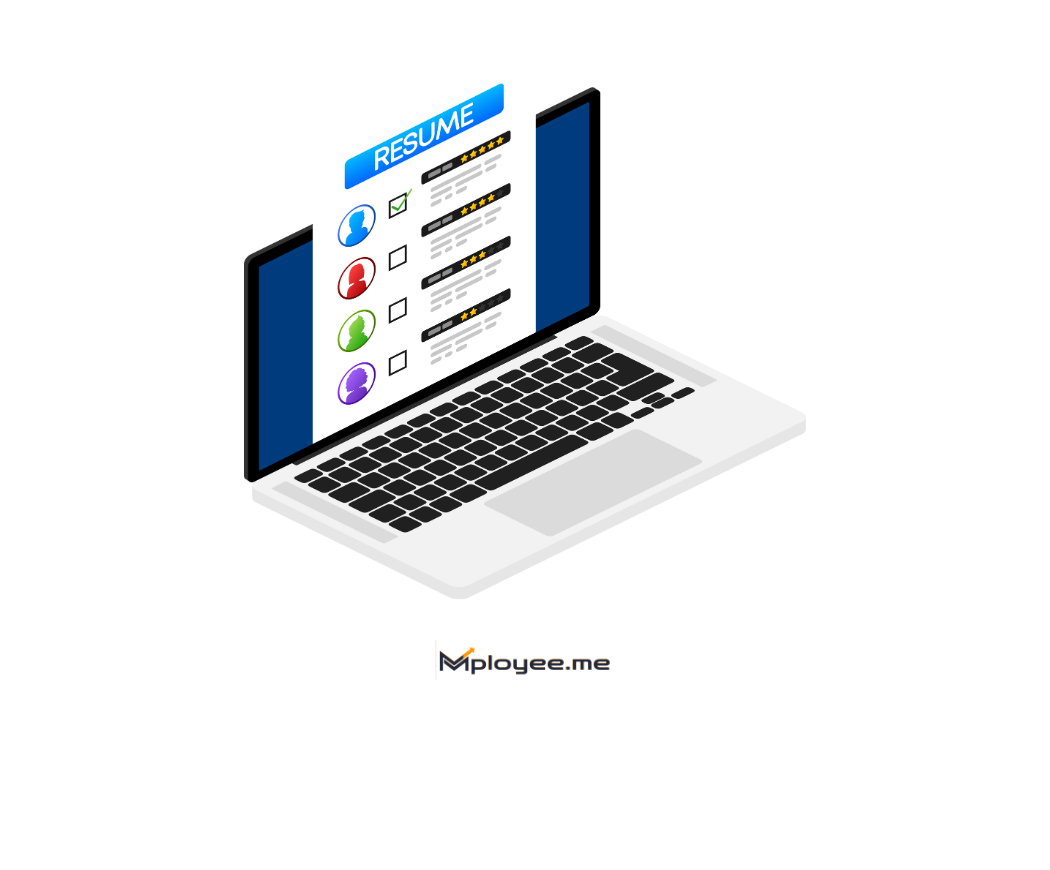
We'll cover
Keyword Magic - Decoding the Language of ATS Systems
Written By Editorial Team

- 📌ATS scans resumes using keywords before recruiters review them.
- 📌Extract resume keywords directly from the job description or use Resume Keywords tool by mployee.me.
- 📌Use action verbs and metrics to strengthen keyword impact.
- 📌Balance ATS optimization with clear, human-readable resume storytelling.
- 📌Avoid keyword stuffing and unscannable resume designs.
We'll cover:
Resume Keywords for Getting Your Resume Noticed
Assume that your resume is a secret person trying to enter the locker room. The guards at the gate (the ATS) only let people with specific clearance (relevant ATS keywords) pass through. So, how do you equip your resume for this mission?
This is where the detective work begins. You should know how ATS systems work to analyze the whole job description document and mark resume keywords & terms that describe the required skills, relevant experience, and necessary qualifications.
- Example: A job description for a customer service representative position might mention ATS keywords like "excellent communication skills," "conflict resolution," and "problem-solving skills."
Don't just stuff ATS resume keywords mindlessly. Incorporate them naturally throughout your resume. Include them in your summary section, skills section, and experience section. You can also design a cover letter with these applicant tracking system keywords.
- Example: Instead of a generic "Handled customer inquiries," rewrite it to "Provided exceptional customer service, resolving customer issues with a 95% satisfaction rate." This showcases your skills (communication, problem-solving) and uses a relevant keyword ("customer service") organically.
Don't limit to one or two applicant tracking system keywords, but on the same side, never overload. Use synonyms and related terms to broaden the keywords for resume scanners pool and job search.
- Example: Instead of just "customer service," consider including terms like "customer support," "conflict resolution," or "client communication."
Don't use too many keywords for resume scanners. Sometimes keyword stuffing can trigger ATS red flags and get your resume rejected. So, prepare an ATS keywords list and focus on a natural integration that demonstrates your qualifications.
Speak the Language of Hiring Managers
Applicant tracking system keywords are your bridge to the hiring manager. By using the right ones, you're essentially speaking their language and highlighting your value proposition.
Using powerful action verbs displays your initiative and positive results. These verbs help bring out your achievements and demonstrate you are decisive. Instead of the generic "responsible for" use verbs that paint a more impressive picture: "managed," "built," "increased," or "led".
- Example: Instead of "Wrote reports," type "Prepared and gave extensive sales reports, which resulted in growing sales leads by 10%."
Numbers speak volumes. Whenever possible, use data and metrics to quantify your accomplishments. This resume writing approach keeps the hiring manager engaged and also helps you pass the resume shortlisting software.
- Example: Instead of "Improved social media engagement," quantify it by saying "Increased social media engagement by 20% through targeted content creation and community management strategies."
Don't submit a one-for-all resume. Analyze each job description and tailor your keywords for resume scanners separately. This shows that you are really interested in the specific position and have an understanding of what a company requires from a candidate.
- Example: Applying for a graphic design position at a marketing agency. Focus on ATS keywords like "social media graphics," "branding," and "content creation." If applying for a graphic design role at a newspaper, highlight "infographics," "data visualization," and "layout design."
Keyword Ninja
Now that you understand the importance of ATS resume keywords, let's turn you into a "Keyword Ninja!" Mastering the art of resume optimization involves the strategic use of applicant tracking software keywords for maximum impact. Use a clear and ATS-friendly format. Opt for simple fonts, bullet points, and a logical layout. This will, in turn, make your resume get scanned without any failures or inaccuracies.
Name your resume file so that it is associated with related words such as your name, job title, and relevant applicant tracking system keywords. It does so by aligning the keywords for resume scanners with the job position and thus makes recruiters quickly spot your resume in the applicant tracking system.
- Example - Don't use "JohnDoe_Resume.docx" for a marketing agency and "JohnDoe_GraphicDesigner_SocialMedia.docx" for a newspaper position. To do this, also change a file name or add information to attract HR preference; for instance, replace the file name "JohnDoe_Resume.docx" with "JohnDoe_GraphicDesigner_SocialMedia
Let ATS keywords appear not just in your work experience but also in the summary, skills section, and perhaps the education part too if required.
- Example - Include your experience with specific design software needed for the specific job (e.g., Adobe Photoshop, Illustrator for a marketing agency or Adobe InDesign, Tableau for a newspaper) in your professional summary as a graphic designer. You should also include both your formal skills (such as software mastery), as well as your interpersonal skills (creativity, communication) that are in line with the job description.
An application tracking system may prompt for information in a specific format; therefore, look for an online resume builder that has ATS-ready templates and ATS resume keywords. These tools can help you optimize your resume format and highlight relevant keywords for resume scanners effectively. Keyword optimization is a skill you can develop. Practice analyzing job descriptions and strategically incorporating relevant applicant tracking system keywords into your resume. Track successful applications and analyze which ATS keywords resonated with employers.
Balancing ATS Resume Keywords with a Compelling Narrative
While ATS resume keywords are important for your job search and resume writing, a stellar resume needs more than just stuffing resume applicant tracking software keywords.
Your resume should speak a summarized story about your skills, experience, and achievements till date. Optimize your resume with the best ATS resume checkers and use strong verbs, specific examples, and quantifiable results to showcase the value you bring to the organization.
- Example - Don't just list "Social Media Marketing Internship." Expand on it by saying "Developed and implemented a social media campaign for a local restaurant, increasing their follower base by 30% and website traffic by 25% within 3 months." This paints a vivid picture of your skills and accomplishments.
Typing mistakes and minor grammatical errors can create a negative impression. Proofread your resume meticulously and have someone else review it for any mistakes. While a clear and readable format is key, consider a minimalist and professional design that complements your brand (if applying for creative fields).
Remember: your resume will act as a marketing tool that brings forward your relevant experiences and skills. Employ resume keywords wisely to go beyond the ATS, but keep in mind the need for a story that will distinguish you from others and intrigue the employer.
How to Identify Keywords from a Job Description
🔍 How to Identify Keywords from a Job Description
Unlocking the right keywords starts with a deep dive into the job post. Scan the responsibilities and qualifications to find terms that repeat. These are usually the exact ATS resume keywords the system looks for.
Use keyword finder tools to automate the process. Just paste the job description and highlight the key terms to include. Make sure to spread these naturally across your resume—summary, skills, and experience.
Strategic Keywords Planning
With this blog, you have decided the language of ATS systems and what they need from a resume!
Mastering the tools and techniques of including keywords for resume scanners boosts your job search process. Strategically planning and incorporating applicant tracking system keywords in the resume, customising it for jobs, and crafting a cover letter to seek attention can help you in getting your dream job. If you are finding a job platform to execute your job search plan, you can start with Job Match Pro because it matches your profile with the best jobs.
Common Mistakes to Avoid with ATS Optimization
🧠 Common Mistakes to Avoid with ATS Optimization
When optimizing your resume, even small missteps can make a big difference. One of the most common blunders is overusing ATS keywords without context. This might help you pass the scanner, but not the recruiter!
Other errors include overdesigning resumes with visuals, ignoring the job description, or sending the same version to every role. Hiring systems need clarity and relevance—so should your resume.
- 🚫 Keyword stuffing without context
- 📊 Fancy charts or unscannable designs
- 🗂️ Reusing the same resume for all roles
- 🔍 Ignoring key phrases from the job post
What is the keyword in a resume?
It is a major word or phrase illustrating your skills, education, job title, or experience. These keywords enable a resume-to-job match and are mostly traced by software called ATS (Applicant Tracking System).
What should one look for in the language of a resume?
What are buzzwords on a resume?
What is the most crucial thing to include in a resume?
What are the strong words on a resume?
What are the 20 best action words?

Got Your Answer ?
Learn this in 30 Seconds 👇
Career Blogs
Our career blog is your go-to resource for insightful advice, practical tips, and the latest trends in the job market.

Office Address: Room No 305, IIT ROPAR-TBIF, Top Floor (East Wing), M.Visvesvaraya, Rupnagar PB, 140001
- Free Online Resume Review
- Check Resume Score
- Job Description Keyword Finder
- Resume Shortlisting Software
- Resume Scanner for Jobs
- Find jobs that match with resume
- Job matching platform
- Resume job matching
- Job suggestion
- Best sites to find jobs
- Free ats resume scanner
- Auto apply for job
- Full Time Jobs
- I Need a Job
- Information Technology Jobs
Can't Find Something? Get in Touch.
©2026 Padhakku Peek A Book Pvt Ltd (Mployee.me)






